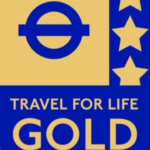From Monday 11th to Friday 15th February, Emanuel celebrated ‘Science Week’. Mrs Brown, Head of Science, speaks about the project and all the activities across the course of the week.
‘Journeys’ is the British Science Association theme for 2019. When you think about it, science is full of journeys. Some of them, like the 1969 moon landings, are obvious examples of human courage and achievement. It is incredible to think that, in the whole 3.5 billion year history of life on Earth, we are the first species to have developed the technology to propel ourselves off the planet that we were formed on (and return safely). The natural world is full of equally astounding journeys, from the unbelievable 71,000km annual round trip of the arctic tern to the epic swim of sperm to egg that is at the root of our existence.
Looking more deeply, science itself can be thought of as a journey, made up of countless small steps made by many individuals over thousands of years, and one that, when we step back and consider it, is absolutely fundamental to our identity as humans.
The sad thing is that scientific journeys, just like everyday journeys, are often taken for granted. Every day we rely on energy harnessed by the design of scientists, surrounded by the comfort of materials developed by scientists, and enjoy our status as citizens of the information age, unimaginable but for the work of scientists. Whilst we have never before been so reliant on science and technology, levels of scientific literacy in our society are surprisingly poor and, disturbingly, science is too often viewed as inaccessible or even boring.
Addressing this issue is what Emanuel Science Week 2019 was all about. Science should not be the realm of the few because it impacts the many, and has a reach that is matched by little else. The human race desperately needs people who will ask the “how?” questions; people who dare to imagine developments that seem impossible, and are equipped with the skills to make them reality.
And Emanuel pupils rarely disappoint. Over 350 of them, from across the age range, took part in one or more of the events of Emanuel Science Week, throwing themselves into daily challenges, Junior Science Club Special, research on “The Greatest Journey”, and even decorating cakes for “The Great Science Bake Off”.
The celebration of science actually started at the beginning of February as pupils in Years 7 and 8 began project work in their lessons on the theme of “A Journey to Mars”. With a focus on learning new skills and applying them to the problem of setting up a human colony on “the red planet”, they experimented with bottle rockets and parachutes, investigated factors that might affect plant growth in space, and carried out chemical tests to identify components of “Martian soil”. In lower school assembly, Years 6 to 8 were taken on a (rather abridged) tour of the development of rocket fuel, culminating with a very loud hydrogen rocket launch across the Hampden Hall. The scene was set for an exciting week ahead.
Each day of Emanuel Science Week itself included a daily challenge, and saw pupils racing around identifying teachers as scientists, decoding messages, finding and defining scientific key terms, and following clues on a treasure trail around the school. Junior Science Club Special was packed out at lunchtimes with younger pupils excited to investigate the physics of spinning, get their hands dirty making “alien blood”, or follow in the footsteps of the ancient alchemists who tried to turn metals into gold. Several pupils tried their hand at taking photos to represent scientific journeys, or baking cakes that included an imaginative edible diagram of the circulatory system as well as some very tasty creations that Mary Berry would have very much approved of.
My highlight of the week, however, was Thursday when 250 pupils from Years 7 and 8 descended on the Science department, excited and ready to display their work on “The Greatest Journey”. From masterpiece models of DNA, to dramatically acted out video clips of Scott of the Antarctic, and powerful posters on the impact of Darwin’s journey on HMS Beagle, the projects were universally well researched, thoughtful, and creatively presented. As always, our pupils rose to the challenge of a difficult task, and the four visitors we had in the department that day were very impressed both by the work on display and the eloquence of the pupils they spoke to.
Emanuel Science Week 2019 was a fun opportunity for pupils to engage with scientific ideas and get a glimpse of the enormous scope of science. If this was its major objective, it was undoubtedly a great success.
But is this enough?
Science, by its very nature, is “hands on” and exciting. Everyone loves explosions and puzzles and practical work, and science can easily be reduced to entertainment. The problem is that, like anything that is worth doing, really getting to grips with science involves persistence, resilience, and a lot of hard work, and this goes against the grain of our instant gratification culture.
I hope that Emanuel Science Week 2019 opened a few people’s eyes to the importance of science, but more than that I hope that it inspires some of our pupils to put in the consistent effort and time that is needed to master the scientific skills that are crucial to the future of our society. Science Week was fun, but the true satisfaction in science is found in grasping something of its intrinsic beauty and explanatory power. Ultimately, this is why we teach. We long for the pupils that pass through our labs each day to share in our enjoyment of the subject, and even step up to take their places as the next pioneers of human progress. And Emanuel pupils rarely disappoint…













